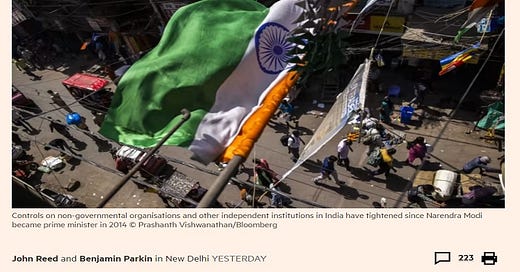There are credible grounds for investigating whether the employees of the “Centre for Policy Research” are de facto foreign agents functioning as the “useful idiots” of their international patrons to meddle in India’s domestic affairs at the expense of its objective national interests.
The UK’s Financial Times (FT) is attempting to artificially manufacture a scandal after complaining in an article on Sunday about the removal of an Indian think tank’s tax-exempt status last month. The “Centre for Policy Research” (CPR) was one of several organizations last September that were audited by income tax officials, after which its license to raise money abroad was suspended in February. Prior to then, the FT revealed that the CPR received a whopping 75% of its funds from foreign sources.
According to this British outlet, that foreign-funded think tank is supposedly “One of India’s best-regarded”, hence why they’re drawing attention to the past year’s developments. That description is questionable, however, since the FT has a narrative interest in framing everything in such a way that their international audience is misled into thinking that democracy is allegedly under attack by the Modi Administration.
As they wrote, “some have speculated [that the authorities] may have been motivated by the CPR’s independent research, media articles by staffers criticising government policies and its work with local activists opposed to controversial coal mine development.” The content of their information products isn’t the problem since India is a pluralistic society where a diversity of discourse is encouraged. What seems to have prompted the authorities to investigate the CPR is its reliance on foreign funding.
It's already suspicious that what’s supposedly “One of India’s best-regarded public policy think-tanks” is only able to operate because of money from abroad, which suggests that their work doesn’t resonate with their compatriots otherwise Indian philanthropists would have replaced this foreign role with time. Even more suspicious is the FT’s admission that the content of the CPR’s work is critical of government policies and includes cooperation with activists opposed to projects of economic importance.
Taken together, there are credible grounds for investigating whether the employees of this policy-influencing platform are de facto foreign agents functioning as the “useful idiots” of their international patrons to meddle in India’s domestic affairs at the expense of its objective national interests. Had the CPR not been so dependent on money from abroad, then its activities wouldn’t have drawn any scrutiny since they’d naturally be attributed to the interests of those Indian philanthropists who fund it.
The above suspicions were lent credence by the FT’s attempt to spin the authorities’ investigation into the CPR as some sort of anti-democratic witch hunt against independent thought leaders even though no objective observer can describe it as independent due to its reliance on foreign funding. What that outlet should have done is remain silent and let the legal process play out instead of trying to artificially manufacture a scandal, especially one that requires their writers to so blatantly manipulate perceptions.
South Asian bureau chief John Reed and correspondent Benjamin Parkin could have simply related the facts as they indisputably exist if they really felt so passionate about drawing attention to this story, but instead they couldn’t resist the temptation to frame everything in a way that misleads their audience. If the shoe was on the other foot and their British homeland was doing the same thing to a 75%-Russian-funded policy-influencing platform, there’s no doubt that they’d defend it on national security grounds.
What all this goes to show is that the CPR is likely a front for foreign actors to meddle in India’s domestic affairs exactly as it’s suspected of being otherwise the FT wouldn’t have reacted in the way that they just did. Its writers rightly sense that the days of the UK and others interfering in that country under the cover of so-called “think tanks” are finally drawing to an end, which is why they’re pulling out all the stops in spinning the government’s latest moves as supposedly being a deathblow for democracy.




